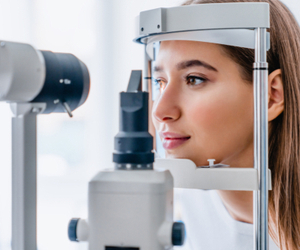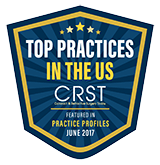Have you thought about having LASIK? Are you frustrated by visual aids like glasses and contact lenses when you need to see?
If you’re a good candidate, LASIK surgery can change your life, giving you the gift of visual freedom. LASIK can sound like a far-off, unachievable dream for anyone who relies on glasses or contact lenses.
But LASIK has never been more accessible than it is right now. Not only is it affordable through a wide variety of no-interest payment plans, but about 85% of people who have LASIK consultations end up qualifying for the procedure.
If you’re thinking about LASIK but aren’t sure if it’s right for you, you can get a good idea of whether you’re a good LASIK candidate. Keep reading for 7 signs that may indicate you’ll be a good LASIK candidate!

1. You Have a Stable Prescription
LASIK is a permanent procedure because it changes the shape of your cornea to correct refractive errors. These include nearsightedness, farsightedness, and astigmatism.
But for the vision correction procedure to remain effective, your prescription can’t change significantly after getting LASIK. If your prescription changes, it will make the results from LASIK less effective and may not fully correct your vision.
Luckily, if your prescription is stable and has remained unchanged for at least a year, there’s a minimal chance it will change after having LASIK.
Your prescription needs to be stable and unchanged for a minimum of at least a year to qualify for LASIK. Some LASIK surgeons require your prescription to remain unchanged for at least two years before they will perform the procedure.
If your eyes are still changing and developing, you’ll have to wait to get LASIK. Doing this ensures that you’ll end up with the best possible results and won’t need an enhancement later on.
2. Your Prescription Isn’t Too High
LASIK can correct nearsightedness, farsightedness, and astigmatism. If you have any of these refractive errors, it doesn’t matter how complex your prescription is, as long as it’s within certain limits. These limits are -13.00 diopters of nearsightedness, +6.00 diopters of farsightedness, and 4.00 diopters of astigmatism.
This range covers most prescriptions, but LASIK cannot fully correct your vision if your prescription is over these limits. However, there may be an alternative vision correction procedure that can.
If you’re not a good LASIK candidate, you may be a better fit for something like the Visian ICL or a Custom Lens Replacement. Make sure to talk to your eye doctor at Williamson Eye Center during your LASIK consultation to learn about all available vision correction options.

3. You’re At Least 18 Years Old
LASIK is only FDA-approved for patients at least 18 years of age. Although teenagers may like the idea of LASIK, it’s not something they can get.
Your body is still growing and developing at this age, including your eyes and vision. Even if your prescription appears to be stable, it’s likely to change until you’re fully grown.
For this reason, most LASIK surgeons recommend getting LASIK in your mid to late twenties. By this time, your eyes should be stable and no longer developing.
There is no upper age limit on when you can get LASIK, but if you’re in your fifties or sixties and want to correct your vision, you may want to consider a procedure like Custom Lens Replacement for the most effective results.

4. Your Body Is Healthy
To undergo any surgical procedure, including LASIK, you need to be healthy. If you have an autoimmune condition like Sjogren’s syndrome, rheumatoid arthritis, or lupus, they can make it more challenging to heal and recover.
You may be able to work around some conditions that affect your body’s ability to heal. In these cases, having a pre-existing condition may not disqualify you from LASIK surgery.
But if you want to get LASIK, you’ll need to be in good health. Make sure to disclose your complete medical history during your LASIK consultation.
In addition to being in good health, you also need to have healthy eyes. To have healthy eyes, you can’t have any pre-existing eye conditions like cataracts, glaucoma, or dry eye syndrome.
One common condition that can interfere with LASIK is dry eye syndrome. If you have dry eye syndrome, you need to have it under control and managed before thinking about getting LASIK.
5. Your Eyes are Healthy

If you have dry eyes or are predisposed to dry eye syndrome, you may not be able to have LASIK. But there are treatments for dry eye that may alleviate symptoms, so you can have the laser vision correction procedure later on. to have LASIK still. Your eye doctor will be able to tell you more once you’ve completed your LASIK consultation.
6. Your Pupils Aren’t Too Large
Another factor that can make a difference with LASIK is the size of your pupils. If you have larger than average pupils, LASIK can cause issues with your night vision.
You’ll have the size of your pupils measured during your LASIK consultation, but you may know if you have larger pupils if it’s something an eye doctor has told you in the past.
7. Your Corneas are Thick Enough
Something you may not know is how thick your corneas are. Your cornea needs to be a certain thickness to have LASIK safely. One of the critical steps during LASIK and why it works involves creating a flap in the cornea to reshape it.
If your corneas are too thin, it can lead to serious problems with your vision. Performing LASIK on someone with thinner corneas may leave them with too little corneal tissue after reshaping the cornea.
You won’t be able to tell how thick your cornea is until you have them measured during your LASIK consultation. But if you meet the rest of the requirements for LASIK surgery, chances are good you’ll make a great candidate.
Getting a consultation also requires no commitment, so if you still haven’t decided if you want LASIK for sure but think you’d make a good candidate, you should schedule a consultation to find out for sure and learn more. Schedule yours at Williamson Eye Center in Baton Rouge, LA now!



